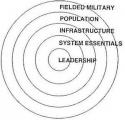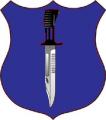It's hard to criticize the basic idea that spreading good governance is a better long-term solution for the world's ills than just killing bad guys. After all, that has been a basic tenet of the National Security Strategy for the last decade. But COL Jones, I think, depends too much on the assumption that troubled states share our belief that government exists for the good of the governed.
Many states - I won't be so cynical as to say most - are organized for the good of the governors, not the governed. Where we have become involved in counterinsurgency, the supported state will pay lip service to our values and stated goals because they want our money, manpower, and killing power. They will give nominal and often half-hearted support to our initiatives in good governance. But...the institution of good governance practices would work against the ability of the elites to maintain their power and sources of income. Even amongst the exploited populace our ideas of good governance often do not resonate, or are seen as positive threats. They welcome the material largesse we bring, but resist the softer aspects of what we consider good governance ( a strong central government, protection of minority rights, rule of law as opposed to customary privilege, etc).
So, a populace-centric as opposed to a threat-centric (not my terms but his - I hate any idea incorporating the pseudoword 'centric') strategy would certainly be as problematic in counterinsurgency.












Bookmarks